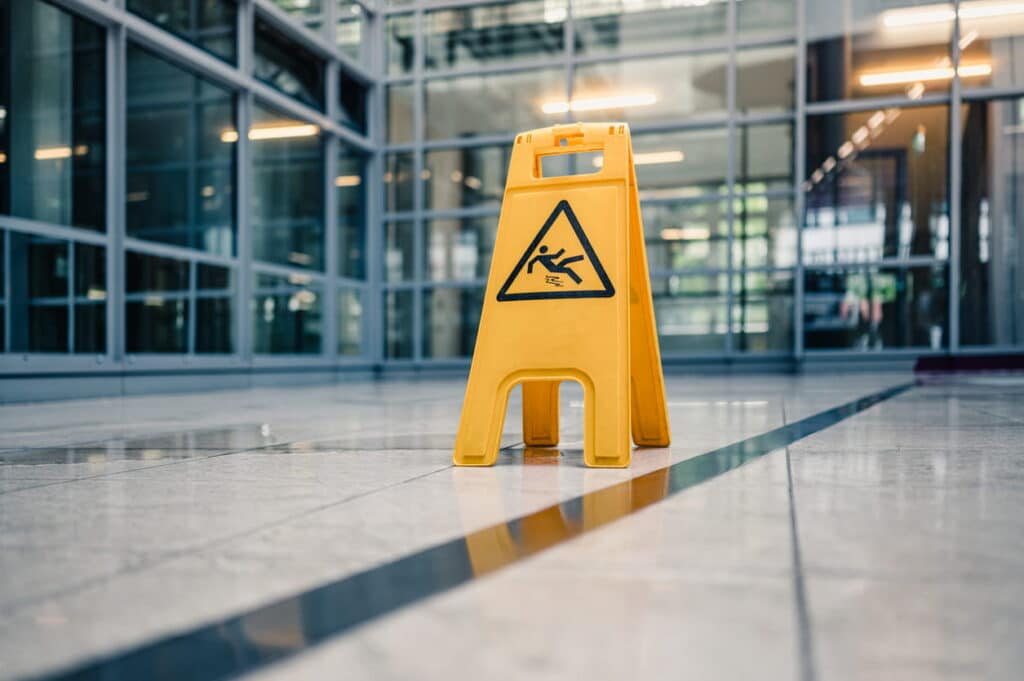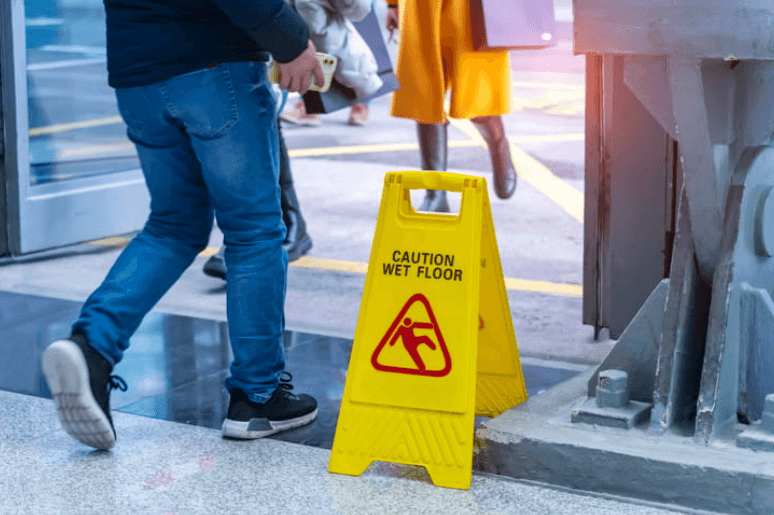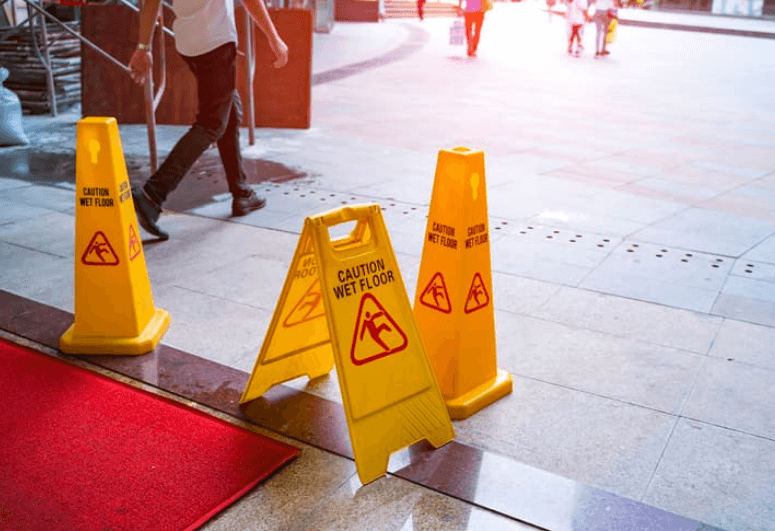
Wet floors are something most people encounter regularly. When a floor is dirty, people deliberately wet the floors while mopping them. In other cases, floors get wet because of environmental factors. Rain and snow can make footwear wet, and when people come inside, they bring moisture with them. The rain or melted snow can build up, creating puddles on floors.
START YOUR FREE CONSULTATION
NO FEES UNLESS WE WIN!
Call (702) 382-0000 for a free consultation

Since wet floors are commonplace, you might be surprised to learn that under premises liability law, you may have legal grounds to seek compensation if you were injured due to a wet floor accident. Premises liability law holds property owners or managers responsible for the condition of their properties. The owners or occupants must take reasonable steps to ensure the property is safe. Therefore, when a property’s owner or occupant doesn’t take steps to identify or eliminate a potential hazard, and that hazard causes an injury, the owner or occupant may be held liable.
Let’s examine wet floor safety, accidents, and injuries and how a premises liability attorney can help you after an injury.
Common locations for wet floor injuries
Wet floor injuries are most likely to occur near water sources. Since bathrooms are a common water source in buildings, you might not be surprised that bathrooms are a leading cause of wet floor injuries. Leaking toilets and spills from bathtubs, sinks, and showers can cause water build-up, leading to slippery floors. Each year, bathroom injuries send hundreds of thousands of people to emergency rooms, with more than 33% of those injuries occurring in the shower or bathtub.
Kitchens are another common water source because they contain water pipes, sinks, and refrigerators. There’s also a greater risk of spilling other liquids in kitchens, including milk, juice, and cooking oil.
In addition to the apparent water sources in bathrooms and kitchens, several other water sources exist in buildings. Water sources that can cause wet floors include the following:
- Dehumidifiers
- Fountains
- Freezers
- Ice Makers
- Humidifiers
- Radiators
- Water Coolers
- Washing Machines
- Water Heaters
It’s also common for people to encounter wet floors at building entrances, particularly when it’s raining or snowing outdoors. Leaking roofs and pipes can also cause wet floors. Sometimes, the water can drip through ceilings, causing wet floors one or more stories below the leak’s source.
How wet floors cause injuries
Moisture affects a floor’s properties. In this context, the floor’s properties are physical characteristics, such as color and hardness. Some buildings feature non-slip flooring, which is textured. Often, non-slip flooring has small raised bumps; it isn’t smooth to the touch. The texture enables it to provide traction. However, suppose a lot of water or snow is on the floor. In that case, the moisture build-up can render the non-slip characteristics ineffective, leading to falls.
Since water build-up reduces the traction of both regular and non-slip floors, people are more likely to lose their footing. Wet floors increase the chances of slip and fall and stumbling accidents.
Slip and fall accidents

A slip & fall from wet floors can cause people to lose their footing and fall to the ground. Slip and fall injuries are one of the most common injury types. The CDC reported that accidental falls were the number one reason people of all ages went to emergency rooms for medical treatment in 2020. Millions of people receive treatment for slip and fall injuries each year, with more than 800,000 people per year requiring hospitalization for fall injuries.
Slips and fall injuries are also primary causes of workplace injuries. One of every four workplace injury claims involves a slip, trip, or fall (STF). At the same time, STFs account for almost two-thirds of all injury-related work absences. Common slip and fall injuries include fractures, sprains, bruises, and head trauma.
Stumbling accident
When people stumble, they may fall to their knees or take big or awkward steps until they regain their balance. People may experience various injuries after stumbling on a wet floor, including bruises, lacerations, injured knees, sprained or broken ankles, or sprained or broken wrists.
The severity of wet floor injuries
The Centers for Disease Control and Prevention (CDC) reports that 20% of falls cause significant injuries.
Fractures
One out of every 20 people who fall will suffer a fracture. Depending on the fracture’s severity and location, it can take over a year for some fractures to heal.
Traumatic brain injury
The CDC reports that falls are the leading cause of traumatic brain injuries (TBIs). TBIs include concussions, skull fractures, and permanent brain damage.
Wrongful death
Wrongful deaths occur when someone’s negligence or deliberate actions cause another person’s death. Falls cause more than 44,000 deaths per year. When a property owner or occupant doesn’t take reasonable steps to warn someone about a wet floor or remove the moisture, and a wet floor injury causes the person’s death, they may be legally responsible for wrongful death.
How to prevent wet floor accidents
One of the best ways to prevent accidents from a wet and slippery floor involves promptly removing the moisture. Mopping the floor, pushing standing water to a drain, or removing excess moisture with a wet shop vacuum are ways to eliminate moisture.
While occupants of all property types are responsible for addressing potential hazards promptly, Nevada premises liability laws require business owners to take additional steps. Business owners must use a wet floor sign to alert customers to the hazard, no matter what caused the wet floor.
Businesses can also prevent accidents by conducting routine surveys to ensure their building is safe. Businesses should also have a system that allows employees and customers to report potential hazards.
Type of compensation you can seek for a wet floor injury
Suppose you slipped on a wet floor and sustained severe injuries. You may qualify to receive financial compensation from the property’s owner or occupant.
Wet floor injury victims may qualify for economic damages, which are expenses you can calculate. These damages include the following:
- Incurred expenses. Suppose your injuries involve a TBI and a fractured leg. You may not be able to drive for weeks or months. You can seek compensation for the cost of using public transportation.
- Lost income. Your injuries could cause you to miss one or more days from work. You can seek compensation for lost income from the at-fault party.
- Medical expenses. Even people with insurance can incur thousands in medical bills after an injury. You may have to pay for deductible costs, prescription medications, and additional treatments, such as physical therapy. Wet floor injury victims can seek compensation for these expenses.
You can also seek non-economic damages, which are costs related to how your injury has impacted your life. Suppose your spouse dies after falling on a wet floor. You can seek compensation for loss of consortium, which is the way losing your spouse affects your life. You can also seek compensation for pain and suffering, grief, and trauma.
How a wet floor accident lawyer can help with your wet floor accident injury

When you consult with a personal injury lawyer from Adam Kutner, Injury Attorneys, you’ll receive expert advice from a legal professional with years of experience with injury lawsuits.
We’ll file the paperwork for your wet floor lawsuit, gather evidence to support your claim, and fight for you to receive the compensation you deserve.
Call (702) 382-0000 for a free consultation
Adam S. Kutner is a top 100 trial lawyer with 33 years’ experience and expertise that will benefit you
Call us at (702) 382-0000 anytime to schedule a free consultation. We will work to get you the maximum settlement as quickly as possible so you can move forward on your healing journey.
START YOUR FREE CONSULTATION
NO FEES UNLESS WE WIN!
Home visits are available
Call now for details
SE HABLA ESPAÑOL

Adam S. Kutner
PERSONAL INJURY LAWYER
With more than 33 years of experience fighting for victims of personal injury in the Las Vegas Valley, attorney Adam S. Kutner knows his way around the Nevada court system and how to get clients their settlement promptly and trouble-free.














